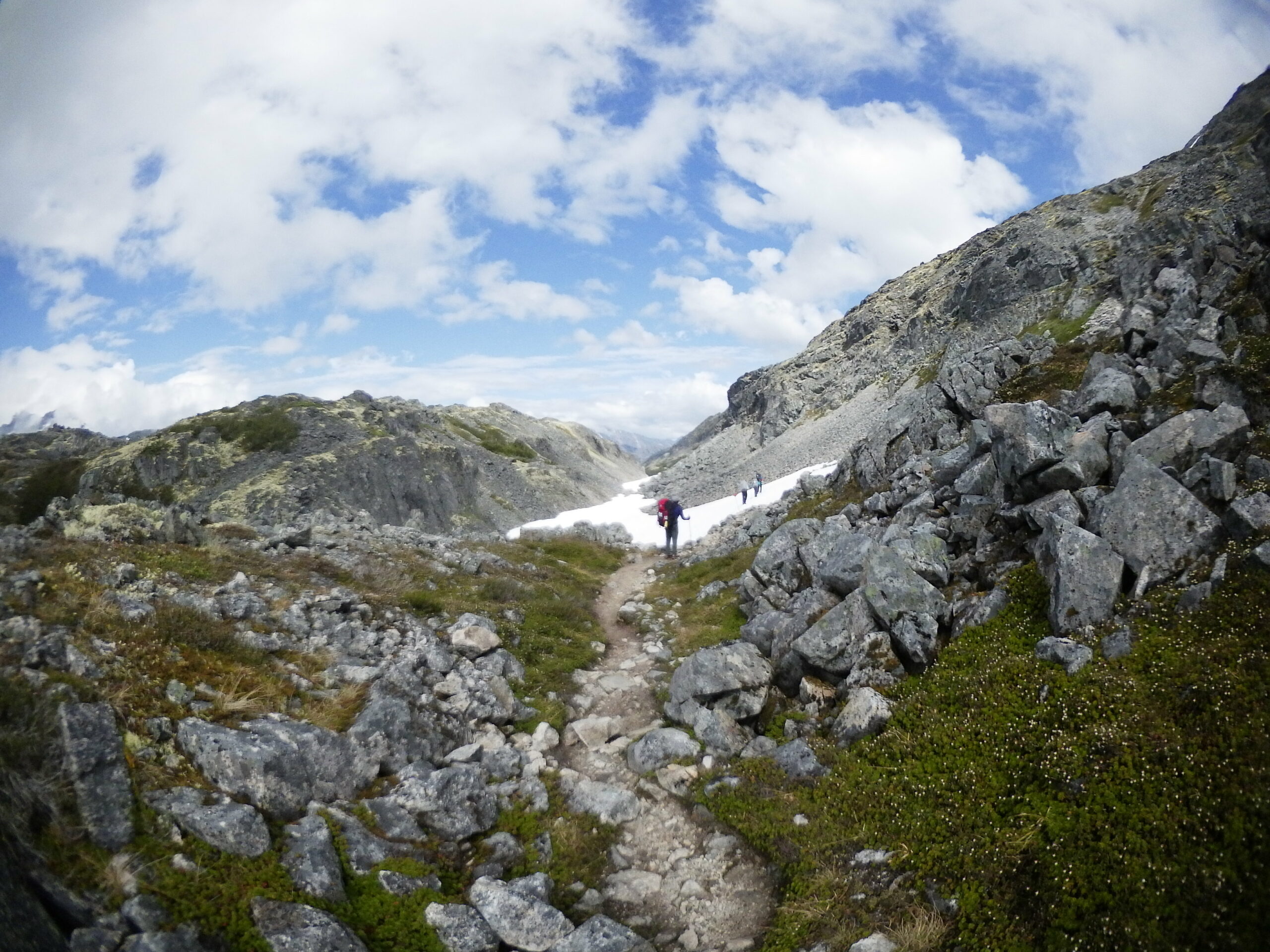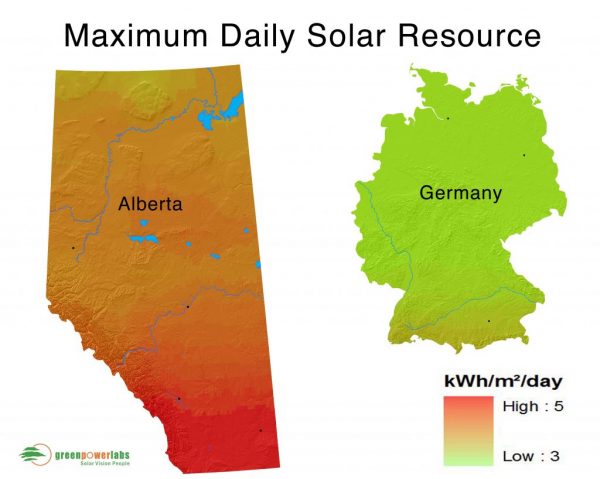
Dave Kelly on the historic Chilkoot Trail
This past week, SkyFire Energy’s own Founder & CEO Dave Kelly embarked on a journey up to the Yukon Territory, where the historic Klondike Gold Rush took place in the 1800s. This trip marks the second such trip this year. The first trip with his wife Karen to re-trace the storied Chilkoot Trail, the 53-kilometre trail through the Coast Mountains from Dyea, Alaska, to Bennett, British Columbia.
The purpose of this second voyage was neither recreational, nor in search of glittery minerals, but rather to promote another source of prosperity for Canada’s future: solar power. Thanks to climate policy and technological advances, renewable energy is forecast to replace 50-75% of coal-fired power by 2030. The Alberta government is serious about addressing the impacts of climate change and creating sustainable growth in the economy. Last week, in what could be viewed as a watershed moment in Canada, the National Energy Board released a report on the long-term energy outlook for fossil fuels, which predicted that Canadians will likely use less fossil fuels in the future. Increasing the share of renewable energy within the energy sector promises to add economic diversity to Alberta’s economy that could create 7,200 new jobs. This is good news for the 7.9% of Albertans that are currently unemployed, but how will it affect consumers that are investing in solar power?
Solar Rush – Boom or Bust?
Due to its high PV potential, Alberta is in a very enviable position and poised for a solar boom. According to the Canadian Solar Industry Association (CANSIA), Alberta’s solar resource is 25% greater than Ontario’s (Ontario boasts ~99% of the solar developed in Canada to date) and 30% greater than Germany’s (the nation with the second highest installed capacity per capita in the world). With new financing options and opportunities such as Energy Efficiency Alberta’s $36M residential and commercial solar rebate program, the Alberta government is incentivizing investment into solar energy for those eager to make the switch to renewable energy and those who required an improved economic outlook (e.g. payback). For skilled workers and professionals looking to transition into the renewable energy sector, PV prospects are looking far better than ever; especially given the recent hard times which have been felt by many in the fossil fuel industry. While some job seekers and business owners may require minimal training to make the leap from oil and gas employment to solar installation, it is also conceivable that consumers who decide to hire less experienced solar contractors could be impacted by their decision.
What Consumers Should Know Prior to Contracting a Solar Installer
One of the beauties of solar energy, with its potential for small, distributed scale is a relatively low barrier to entry relative to other forms of energy. The low barrier to entry within the solar industry could be a double-edged sword, however. On one hand the low barrier to entry means that meaningful employment for hard-working individuals in a time of economic downturn can be had. Further, a proliferation in new start-ups has resulted in a very price competitive environment which is likely to reduce the installed cost of solar.
On the other hand, the low barrier to entry also means that any electrician has the ability to call themselves a solar PV installer despite a lack of experience with designing and installing these unique systems. While there may be a prevailing belief that solar PV systems are somewhat standardized and plug and play, any seasoned and credible installer will suggest otherwise. Designing solar PV systems can be both simple and quite complex with numerous equipment options and modelling inputs to be considered. At SkyFire, each system that we install is custom designed to meet the unique needs of our customers.
While one would certainly hope for the best and that all new entrants would share SkyFire’s long-term commitment to the sustainability of this industry, examples in other jurisdictions (e.g. Ontario) and within other industries and other products would suggest otherwise. In fairness, some of these new entrants will not understand the intricacies of the industry, including the consolidation that has been well-documented over the years. The desire to compete in this industry will ensure that the lowest priced components will be incorporated into the system design at the expense of reliability and long term results. It will be tough for consumers to evaluate multiple proposals as the contents of any given quote will have intricacies that will not necessarily be evident without further investigation. Further, production forecasts may be generated by off the shelf software with no reference to actual systems installed in the local area and accounting for extensive variables such as snow losses.
SkyFire conducts a site assessment for each system that we design and quote to ensure that the system that we are putting forward can actually be installed. Again, in the interests of low costs, some installers may put forth quotations having never visited the site to confirm aspects such as roof size, locations of obstructions, roof condition and electrical system. The result could be a system designed and quoted that will not work for one or more reasons.
Theoretically, healthy competition between solar organizations is good because it encourages competitive prices for consumers. However, when you compromise the quality of your solar system, which should last upwards of 30 years when designed and installed using industry leading components and best practices, are you really saving? The answer in many cases is likely to be no. While the upfront cost may be greater with a company that guarantees its products and services and only purchases reliable products from trusted manufactures, the upfront savings may be at the expense of mid to long-term maintenance costs. As an engineering, procurement and construction firm with 16 years of experience and a stated mission of “leading the adoption of reliable solar power”, SkyFire believes strongly that the sustainability of our industry is premised on system reliability and great customer service. Regardless of who you purchase a solar PV system from, please ensure you have done sufficient due diligence to ensure that you are receiving products and services which meet your short and longer-term goals.
A Guide to Choosing the Right Solar Provider for You – Courtesy of CANSIA
- Do your research
- Solicit multiple quotes
- Make sure your expectations align with those of the quoting companies
- Enquire about the number of systems the company has installed, PV installation certification for their company, length of time being in business, warranties for their products and their installation labour
- Request references
- Request documentation
- Require a thorough and comprehensive contract

Clean Energy Resource’s – Alberta Maximum Daily Solar Resource
What Sets SkyFire Apart
SkyFire Energy is leading the adoption of reliable solar power with:
- In excess of 19 years designing and installing solar PV systems
- An employee-ownership model and a high level of commitment to our staff and our customers
- A B-Corp status which reflects our commitment to meeting social sustainability and environmental performance standards, meeting accountability standards, and ensuring transparency to the public
- A highly involved executive team that includes a board member of CanSIA (Canadian Solar Industries Association) as well as current board members of ACE (Alberta Renewable Energy Co-operative), Light Up The World (a non-profit implementing solar power systems around the world) and Solar Energy Society of Alberta
- A staff that includes Professional Engineers, Certified Photovoltaic Technicians (CanSIA/Seneca College) and CSA Certified Construction Electricians (Solar PV Systems Certified)
- Experience installing more than 1800+ renewable energy systems across Canada
- Solar PV systems in operation on more than 20 utilities in Canada
- COR (Certificate of Recognition) for highest possible construction safety standard as certified in part by the Government of Alberta showing that the firm’s health and safety management system has been evaluated by a certified auditor and meets the standards established by Occupational Health and Safety (OHS)
- Commitment to tier one manufacturers to ensure the availability of product warranties, should warranty service or replacement be required during the various product warranty periods

